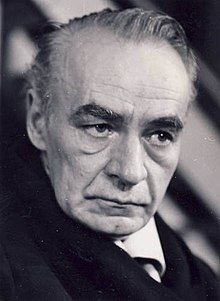Emil Botta | |
|---|---|
 Portrait photograph of the aging Botta | |
| Born | 15 September 1911 Adjud, Putna County, Kingdom of Romania |
| Died | 24 July 1977 (aged 65) Bucharest, Socialist Republic of Romania |
| Occupation |
|
| Period | c. 1929–1977 |
| Genre | |
| Literary movement | |
| Signature | |
Emil Botta (Romanian pronunciation: [eˈmil ˈbota]; 15 September 1911 – 24 July 1977) was a Romanian actor, poet and prose writer, the younger brother of poet-essayist Dan Botta. Though born in Western Moldavia, the two boys were raised by their Corsican mother in Muscel County; as a teenager, Emil rebelled against his upbringing and ran away to Bucharest. Upon arriving there, he embraced a bohemian lifestyle that clashed with Dan's academic success; he took small jobs, had samples of his poetry and film criticism published, and, upon graduating from the Conservatory for Dramatic Arts, began a short career in boulevard comedies. As an opinion leader in the early 1930s, he rallied with the avant-garde's struggle against the "old folks", forming an anti-establishment club called "Ship of Failures". His career as an actor was finally launched in 1938, when he drew notice for his performance as Young Werther in production at the National Theater Bucharest (TNB). He found permanent employment on that troupe, developing an acting style that critics viewed as unique and fascinating, if "mannerist".
Botta also achieved fame as a writer, with poetic cycles which came to be regarded as some of the best in Romanian literature. Rooted in modernism, with surrealist, expressionist and hermeticist characteristics, his verse opened itself to borrowings from neo-romanticism, dark romanticism, and Romanian folklore; increasingly "bookish" in nature, it was also informed by Botta's study of Shakespearean tragedies. Like his parallel forays into fantasy literature, it illustrated Botta's brand of existentialism, and his belief in life as a series of "masks". In the politicized climate of the interwar, Botta was an independent, though he remained close to fascist intellectuals—including his brother, who had sided with the Iron Guard. During World War II, he was preserved as a TNB actor by the Guard's National Legionary State, and then by Ion Antonescu's dictatorial regime; he survived as an actor after the anti-fascist coup of August 1944, being subsequently cast in socialist plays, but also in some early adaptations of American theater. He alternated these with a classical repertory, and was a much celebrated Othello.
After the inauguration of the Romanian communist regime in 1947–1948, and throughout the 1950s, Botta came to be relied upon by the new socialist-realist establishment, appearing in numerous stagings of Russian and Soviet plays. Though he received national accolades for this work, he was effectively banned for publishing his poetry, which was entirely incompatible with the new aesthetic standards; he also led an ascetic and increasingly lonely existence. The de-Stalinization process which began in the late 1950s saw him taking on more diverse roles: on the TNB stage, he was beloved as Crazy Ion in Ion Luca Caragiale's Năpasta; in his film career, he became a favorite actor of Ion Popescu-Gopo, beginning with a celebrated cameo in A Bomb Was Stolen. In the relaxed political climate, Botta was also rediscovered as a writer, and had his work reedited; he also began writing new poems. He became sought after as a voice actor, and earned additional exposure for his work with Lucian Pintilie on The Reenactment—which mounted a direct challenge to the communist regime's official tenets. In the 1970s, Botta's health declined sharply, something which his friends attributed to his years of wanton physical consumption. He died of heart disease at a hospital in Bucharest, shortly before his 66th birthday.